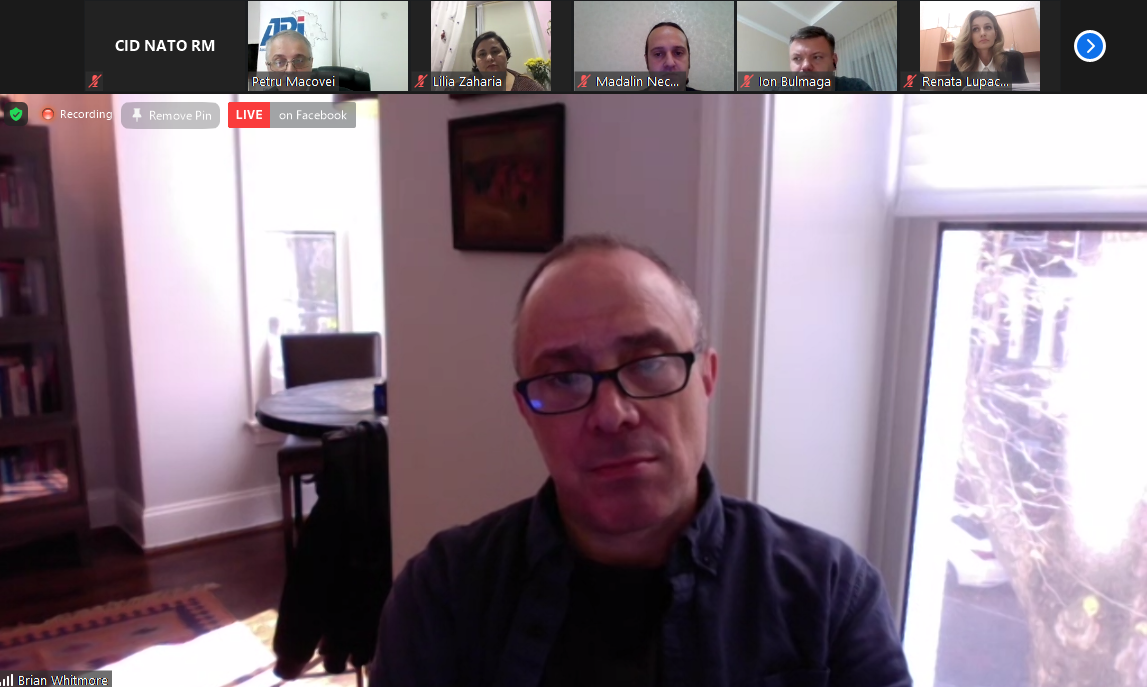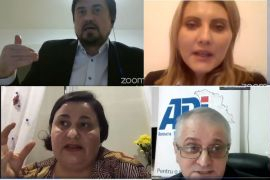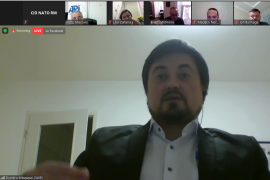back
JAS Press Club: Disinformation campaigns in elections vs national security

Zoom.us capture
The disinformation campaigns during the election periods, the resilience of citizens to misinformation and the impact on national security were discussed at the second press club within the JAS program – Journalism in the field of defense and security. The online event was organized on December 11, 2020 by the Association of Independent Press (API) and the Information and Documentation Center on NATO (IDC on NATO).
The JAS press club “Disinformation campaigns in elections vs national security” brought together about 30 journalists, national and international security experts, activists and other people interested in how the vote of citizens is influenced by misinformation and its impact on the system of national security.
The press club can be watched here:https://youtu.be/cHiW39wBRiQ.
In the opening discussion, Elena Marzac, Executive Director of IDC on NATO, referred to the dangers and harmful consequences of misinformation for the information space of our country, for public safety and health, but also for effective communication. “A recent report by the Romanian Center for European Policies shows that Moldova is one of the European countries most affected by disinformation campaigns coming from the Russian Federation, the content of which is taken over and promoted by some Moldovan politicians and representatives of the Orthodox Church, as well as pro-Russian media. This way, Moldova is a test site for the projection of Russian influence in Eastern Europe and one of the countries most exposed and vulnerable to the information warfare tactics of the Kremlin”, remarked Elena Marzac, emphasizing that the impact of misinformation and propaganda on national and human security materializes in the polarization of Moldovan society, undermining security policies and the democratic process, influencing the agenda and decision-making process, diminishing trust in state institutions and non-compliance with the rules imposed by them.
One of the guests of the JAS press club, Dumitru Minzarari, Research Associate at German Institute for International and Security Affairs (SWP), spoke about technologies for influencing public opinion, initially developed and tested in the Russian Federation and then used in other countries. He referred to the interconnection between people’s political preferences, their perceptions and the actions that result from them. “It is known that people’s political preferences are largely determined by the socio-economic development of a society, and political actors who understand this logic use it in order to influence and manipulate the electorate. An example would be the manipulation circulated by the Russian press lately that the Russian Federation is the most important economic partner of Moldova, although the reality is different. The media forms perceptions, and the “aura” of expertise that televisions induce can easily influence the audience. We see, for example, how some Russian televisions bring in studio people they present as great experts, even though no one knows their expertise. The same technique was used intensively in the Republic of Moldova “, mentioned Dumitru Manzarari. He also referred to the impact of misinformation on national security, describing this type of information aggression as a population-centered war, because the population, but also the political elites are the target of these campaigns. For example, Russia has become an active domestic political actor in Moldova through political actors and the controlled media in Russia, thus reaching directly to any citizen and can influence their political perceptions, and the loyalty of Moldovan citizens is transferred to another state.
Brian Whitmore, Non-Resident Senior Fellow at The Atlantic Council, Adjunct Assistant Professor at the University of Texas-Arlington in the United States, spoke about Russia’s disinformation campaigns against democratic institutions. He mentioned the importance of understanding and explaining the “collective fictions” and conspiracy theories that Russian propaganda and certain political actors in other countries exploit and speculate in order to influence citizens’ perceptions. “People need to be told more and more in detail the objective truth about various social and political issues, without idealizing the state of affairs, so as to increase resilience to false narratives,” Brian said. Answering a question about the role of journalists in reflecting overtly false or speculative statements by politicians, he noted that journalists at top US media outlets are increasingly abandoning the principle of balanced presentation when it comes to politicians’ speculation, choosing, instead, to accurately inform the public of the falsity and lack of evidence of these allegations. Referring to the different resilience of citizens in rich countries compared to those in poor countries, Brian mentioned the Baltic countries, where trust in public institutions is very high and the level of corruption is very low. In addition, media literacy education of children from an early age takes place in these countries. Taken together, these elements ensure citizens’ resilience to misinformation.
Lilia Zaharia, Editorial Coordinator of the Stopfals.md portal, and Madalin Necsutu, “BALKAN INSIGHT” correspondent in Chisinau, spoke about the disinformation campaigns during the 2020 election campaign for the election of the President of the Republic of Moldova, presenting false news and propaganda narratives promoted in this campaign, by media sources in the Russian Federation, Russian politicians and officials, but also by pro-Russian and pro-PSRM media in the Republic of Moldova.
The experts answered questions from the moderator and participants, following an exchange of views on measures to be taken by the authorities to reduce the impact of misinformation campaigns on national security and on the role of journalists in the fight against misinformation.
“Journalism in Defense and Security Matters (JAS)” is implemented by the Association of Independent Press (API) in partnership with Information and Documentation Center on NATO (IDC on NATO) and funded by a grant from the United States Department of State. The opinions, findings and conclusions stated are those of the author[s] and do not necessarily reflect those of the United States Department of State.

